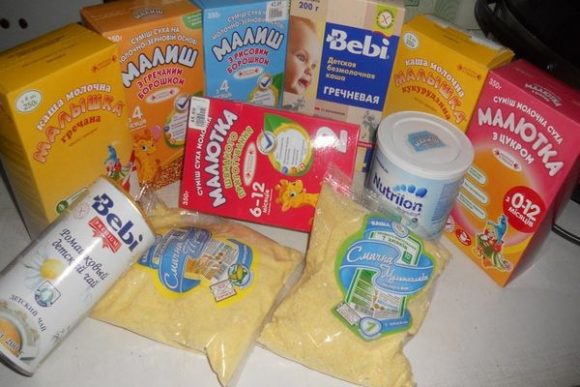The importance of oils in a baby's diet
Butter and vegetable oils include:
- fatty acid;
- proteins;
- vitamins;
- amino acids;
- minerals.
Thanks to the entry of such substances into the body, its normal growth and functioning is ensured, digestive processes are normalized, and the immune system is activated. Butter stimulates brain function, promotes the timely formation of teeth and proper bone growth, maintains the necessary level of skin moisture and healthy hair.
Vegetable oils (sunflower, olive, corn) allowed before the child reaches the age of 12 months improve the functioning of the cardiovascular system, participate in the formation of tissues of various organs, maintain the visual organs in normal condition, promote proper coordination of movements, and a timely transition from crawling to walking.
The belated introduction of such products into the baby’s diet or their complete absence is fraught with the appearance of various health problems at an early age, and a lag in physical and mental development.
It is important to take into account that oily substances are a source of cholesterol, an excess of which leads to negative health consequences. That is why they should be present on the children's menu in small, age-appropriate quantities.
Which oil is best for babies?
Any oil is beneficial if consumed and included in the diet in accordance with norms and standards. It’s impossible to say for sure which oil is better for infants. Each is a real storehouse of valuable microelements. It is important that unrefined vegetable oil contains a lot of useful substances that are vital for every developing organism.
The oils contain:
- Sitosterol.
- Lecithin.
- Vitamins A, E and D.
It is important to know that when heated, many vegetable oils, or rather the vitamin E contained in them, are destroyed. This leads to the formation of carcinogenic products. Therefore, no heated vegetable oils should be given to babies. Exclusively fresh oil as an additive to mixtures and purees.
Sunflower is not enough for babies
It is not easy to determine the real benefits that sunflower oil brings to a baby. Enriched with vitamins E, A and D, it is well accepted by the child’s digestive tract and has a positive effect on the skin and intestinal function. The vitamin D contained in the oil is simply invaluable for the normal development of the child and the prevention of rickets.
Sunflower oil for infants is useful in the form of small additions to the diet in fresh form. It is better for children not to consume fried foods.
Olive oil for babies
This oil is useful for both adults and children. Olive oil has invaluable benefits for babies due to its large number of useful components. Benefits of oil for the development of a child’s body:
- Beneficial effects on the cardiovascular system.
- Strengthening the walls of blood vessels.
- Maintaining active development of all tissue types.
- Optimal effect on the baby's vision.
- Helps regulate movement coordination.
- Prevents the development of mental disorders.
Thus, olive oil is a must for babies. Timely management helps to cope with many health problems at an early age and nourishes the tissues with the necessary nutrients.
Palm oil for babies
Palm oil for infants is often used in infant formulas. Due to their high degree of purification, the oils are absolutely natural and can be taken by children. You should not consume palm oil on your own. And as a baby food it’s actually more complete. In addition, it has been proven that the type of emulsion in which it enters the stomach is perfectly absorbed.
Additionally, it should be noted that palm oil for infants is useful for:
- Works of the colon.
- Processing and removal of harmful substances, excess carbohydrates, toxins.
- Removing excess bile acids.
Thus, palm oil for infants has more benefits than harm.
When to introduce complementary foods to infants
Many pediatricians are unanimous in their opinion about the age at which it is necessary to enrich a child’s diet with oil products. In accordance with the recommendations of experts, they should appear on the menu after 8 months in children who are breastfed, and upon reaching six months in children receiving an adapted formula instead of mother's milk.
The famous children's doctor E. O. Komarovsky recommends supplementing complementary foods with butter when the child is well acquainted with vegetables, cereals, and fermented milk products.

Rules for introducing complementary foods
The creamy product is introduced into complementary foods as an addition to a variety of cereals, potato and meat purees, and vegetable broths. When added to these dishes, it will not only improve their taste, but also help better digestion of the starch contained in grains and root vegetables. It should be added not during cooking, but immediately before serving to the child.
Vegetable oil is introduced into the baby's diet first, then butter. This is due to the fact that substances of animal origin are more difficult to digest in most children.
The recommended pause between getting used to such products is about one month. It is important to remember that oils should only have a natural composition. It is prohibited to use low-fat foods, margarine or spreads containing additives of synthetic origin as complementary foods.

When a child’s body masters culinary innovations, it is necessary to constantly monitor the development of a possible negative reaction.
If a child experiences signs of allergies or frequent stools, you will have to temporarily refrain from consuming the oil. Such phenomena are most often associated with a lack of enzymes and imperfections in the digestive system.
How much butter and vegetable oil should you give your baby?
There are special standards for baby food that describe how much creamy or vegetable product can be given to a child of the first year of life. They look like this:
- The daily norm for babies receiving artificial nutrition is 1 g by 6 months, 3-5 g upon reaching 7 months, 5 g at 8 months.
- The daily portion of the product for children who are breastfed is 1 g starting from 8 months.
When the child turns 9 months old, it is allowed to add 3-5 g of oil to food (without taking into account what the method of feeding the baby was in an earlier period). At 10-12 months, the recommended amount of product per day is 5 g.

As the child develops, the portions of oils in the daily diet should gradually increase. For children from 1 to 3 years old, the norm of a creamy or vegetable product is increased to 6-10 g. After 3 years, the child should receive 10-15 g every day. At this age, butter is not only added to cooked porridge and other dishes, but is also offered to the baby with bread and pastries.
Butter for a child: when can you give it?
It is recommended to introduce butter into complementary foods for a child only when he has already become “acquainted” with porridge, cottage cheese and other dairy dishes. This product can be introduced to an infant who receives infant formula from 6-7 months; a breastfed baby can be given the oil after 8 months.
How to properly add butter to baby foods:
- It is recommended to introduce it only when the baby is already consuming vegetable oil. First of all, the baby is given olive oil and only after that other types of fats.
- It is best to feed children buckwheat or any other porridge with the addition of butter - it improves the digestibility of the dish and allows the body to get the maximum nutrients from it.
- For children 6-8 months old, it can be given in a minimum dosage - the permissible daily intake is 1 g per day. With good tolerance, the rate gradually increases to 5 g per day.
- Babies who are fed an adapted milk formula are allowed to be given a 1.5-2 times larger portion of a dairy product than breastfed infants.
- For ages 2-3 years, the maximum allowable intake is 10 g (two teaspoons) per day.
- Children over 3 years of age are allowed to give up to 15 g, adding it to various cereals, casseroles, puddings, omelettes, stews, making sandwiches and other dishes.
- Oil must be added to a ready-made dish and not subjected to heat treatment.
Oil for children and complementary foods - vegetable olive and butter, which one should you give to your child?
The creamy additive should be introduced into baby food very carefully. In no case is it recommended to exceed the age standards of the product, as this can lead to disruptions in the functioning of the children's digestive system.
Help in choosing oil for a child
For parents planning to introduce a creamy or vegetable product into their baby’s diet, it is important to know how to choose it correctly and which oil will not cause a negative reaction from the child’s body. When purchasing butter for feeding your baby, you should carefully study its expiration date, composition and appearance. If possible, it is also recommended to taste the oil products.
High-quality butter is yellowish in color and has a characteristic, pleasant aroma of cream. Its composition should not contain any flavorings or flavoring additives. Pediatricians advise giving preference to a creamy product with a fat content of at least 82.5%.
Vegetable oils that can be safely included in baby food have a beautiful color. They should be transparent, without cloudiness or sediment. For baby food, you should choose refined products, which will minimize the risk of developing an allergic reaction. Cold-pressed oil is also considered useful, as it retains as much as possible all the valuable natural substances in its composition.
Olive oil
Olive oil is well known as a healthy oil, especially when used extra virgin (organic). Olive oil contains a high degree of monounsaturated fat as well as fatty acids present in breast milk and promotes baby growth. It also contains several important vitamins such as A, B, C, D, E and K.
Let's look at a few benefits of including olive oil in your child's diet.
- Olive oil helps brain development.
- The oil is rich in vitamins. Olive oil in baby food is a storehouse of many essential vitamins. Vitamin A is one such example. A child needs vitamin A for proper eye development. Olive oil is also rich in vitamins D and B. Both of these vitamins are essential in a child's body. Growing bodies need Vitamin D for strong and healthy bones.
- Olive oil is rich in vitamin E. It helps keep your baby's skin and hair healthy.
- Olive oil contains "good" calories. Including this oil in your child's diet is a healthy choice. Thus, the baby will receive his daily calorie intake. Parents won't have to worry about him getting "bad" or unhealthy calories.
- Helps fight obesity. This is due to the “good” calories present in olive oil. Studies have shown that children who consume olive oil are less likely to become obese.











